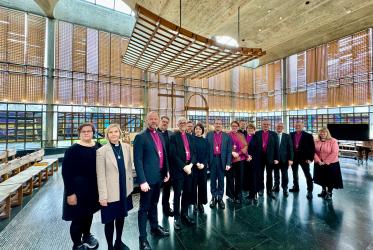As organizations worldwide intensify their work on issues of climate justice, and the clock is ticking for new climate commitments to take shape, members of the World Council of Churches (WCC) Working Group on Climate Change have gathered for a four-day meeting to strategize for effective climate justice action and for strong participation of faith-based initiatives at the United Nations Conference on Climate Change in Paris (COP21).
The meeting is held on 8-11 June and is hosted by the Orthodox Academy of Crete, Greece.
On the agenda of the meeting are numerous sessions on themes relating to challenges for churches and faith-related organizations in promoting climate action, youth contributions to issues of climate justice, recent church initiatives from different regions of the world, and possible responses to the major challenge of achieving a stringent, just and fair agreement at COP21.
During the meeting in Crete, the group is devoting time to explore the Pilgrimage of Justice and Peace as a call to the ecumenical movement that emerged at the WCC Busan assembly in late 2013, to see what its meaning is for the work on climate change. In addition to group reflections, interventions and the sharing of experiences, the group devote themselves to time for creation, finding strength in common prayer to find new ways forward, and in exploring the theological foundation on which decision-making and strategizing may be based.
Attending the meeting are representatives from various WCC member churches, Christian youth organizations such as the World Student Christian Federation (WSCF) and the Ecumenical Youth Council in Europe (EYCE), as well as interfaith initiatives such as Greenfaith, and the Center for Earth Ethics at Union Theological Seminary, thus stimulating reflection on a breadth of issues concerning climate justice, including youth challenges, finding ways to provide a platform for the voiceless, challenges in climate justice work, economic justice and the divestment of fossil fuels.
Speaking about the impact of the working group for international bodies’ work towards climate justice, Karenna Gore from the Center for Earth Ethics, at Union Theological Seminary, says, “this meeting represents an essential element to our capability to solve the climate crisis in that it articulates the present ecological destruction in terms that are moral, religious and central to the very core concepts of Christian witness and mission in the world”. “I am very impressed and moved by the substantial focus of the working group on voices from the global south, and what the impact and thinking is on climate change in regions such as Africa, Latin America, and the Pacific. These are really important voices that are not always given the chance of being heard as strongly as they are in this working group”, she adds.
Dr Julia Edwards, from the Pacific Conference of Churches, reports that although the future is likely to hold less frequent cyclones in the Pacific region, they are likely to be more impactful, and she stresses the importance of local churches in the region as a network for humanitarian aid. “The first responders are always the churches”, she comments. “Any other emergency agency, no matter how well prepared, will always take 24-48 hours before they arrive. This means that people need to be self-reliant for that critical period of time, and they do so often with the support of the churches on the ground”, she says.
From the interfaith perspective of Green Faith and the Our Voices campaign, Rev. Fletcher Harper comments that “we have been given an incredible gift and we need to protect it. The science is clear about what is needed, which is a massive commitment from world leaders to work together to avert a global climate crisis“.
Dr Guillermo Kerber, programme executive of Care for Creation and Climate Justice at the World Council of Churches, stresses the value of the Pilgrimage of Justice and Peace as inspiration for the working group in moving towards COP21, stating that “many member churches are organizing pilgrimages for climate justice this year strengthening ecumenical collaboration, interfaith coordination and links with civil society organizations.”
Kerber also stresses, however, the need to reflect on strategies “As a fellowship of Christian churches, the WCC deepens the theological insights of caring for creation and climate justice and try to translate them into advocacy work”, he says. “The Act now for climate justice campaign, for instance, reflects the key demands the ecumenical movement is having for the climate negotiations”, he adds.
More information about the WCC’s work in climate justice
Act Now for Climate Justice campaign launched on Earth Day (WCC press release of 22 April 2015)
Pilgrims of climate justice plan to impact COP 21 in Paris (WCC press release of 23 January 2015)
WCC general secretary highlights “right to hope” in a panel on climate change and human rights (WCC press release of 11 March 2015)





